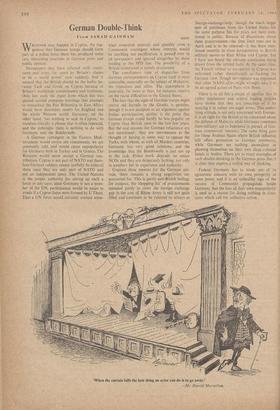German Double-Think
From SARAH GAINHAM
BONN
WtinTr.vtit may happen in Cyprus, the sug- gestion that German troops should form part of a police force there has produced some very interesting reactions in German press and public opinion.
Newspapers that have referred with resent- ment and irony for years to 'Britain's claims to be a world power' now suddenly Lind it natural that the British should be the buffer be- tween Turk and Greek on Cyprus because or Britain's worldwide commitments and traditions. Only last week the paper from which this was quoted carried pompous warnings that attempts to resuscitate the Pax Britannica in East Africa Would have disastrous results for England and the whole Western world. Germany, on the other hand, 'has nothing to seek in .Cyprus,' to translate literally .a phrase that is often repeated, and the imbroglio there is nothing to do with Germany- and the Bundeswehr.
A German contingent in the Eastern Medi- terranean would revive old resentments, we are constantly told, and would cause unpopularity for Germany both in Turkey and in Greece. The Russians would never accept a German con- tribution. Cyprus is not.part of NATO and there- fore German soldiers cannot lawfully be ordered there since they are only part of NATO and . not an independent army. _The United Nations is the proper authority for setting up such a force in any case; since Germany is not a mem- ber of the UN, participation would be easier to evade if a Cyprus force were formed by U Thant. That a UN force would certainly contain some-
what unneutral neutrals and possibly even a Communist contingent whose interests would be anything but pacification, is passed' over in all newspapers and ignored altogether'by those tending to the SPD line. The possibility of a British withdrawal is crossly discounted.
The conciliatory tone of dispatches from. German correspondents on Cyprus itself is most noticeable, especially on the subject of Makarios, his intentions and allies. The atmosphere is neutralist, far more so than, for instance, reports on the racial difficulties in the United States.
The fear that the sight of German troops might revive old hatreds in the Greeks is genuine, though it is not accepted as an argument against Italian participation; neither is the point that German troops could hardly be less popular on Cyprus than British ones in the last few'years. But the real reasons for German reluctance are not mentioned: they are nervousness at the thought of having in some way to oppose the Turks, with wham, as with all Moslem countries, Germany has very good relations, and the knowledge that the Bundeswehr is just not up to the task. Police work depends on senior NCOs and they are desperately lacking, not only in numbers but in experience and authority.
Granted these reasons for the German atti- tude, there remains a strong negativism un- accounted for. This is partly anti-British feeling; for instance, the 'shopping list' of procurements intended partly to cover the foreign exchange gap in the cost of Rhine Army is still not quite filled and continues to be referred to always as 'foreign-exchange-help,' though the much larger sum of purchases from the United States for the same purpose has for years not been men- tioned in public. Because of discussions about. these procurements—the time limit runs out in April and is to be renewed—it has been men- tioned recently in close juxtaposition to British military moves to East Africa and Cyprus; but 1 have not heard the obvious conclusion being drawn from the related facts. At the same time. the French refusal to co-operate in Cyprus \k,H welcomed rather shamefacedly as hacking :11, German view, though nervousness was expresso.I that other NATO allies might wrongly lake it be an agreed action of Paris with Bonn.
There is in all this a streak of egotism that k rather unpleasant and several leading es
. article have shown that they are conscious of it by denying it in rather too eager terms. This under- lying attitude is not only concerned with Europe. It is all right for the British to be concerned about the defence of Malaysia while Germany continues (non-military) aid to Indonesia in pursuit of Ger- man commercial interests. The same thing goes for those, Arabian States where British influence still offers protection to German commerce, while Germans see nothing anomalous in pluming themselves on their own clean colonial hands in Arabia. There are so many examples of such double4hinking in the German press that it is clear they express a settled way of thinking.
• Federal Germany has to break out • of its egocentric concern with its own prosperity at some point; and it is an unhealthy sign of the success of Communist propaganda inside Germany that the fear of their own unpopularity is used as a reason for doing nothing in situa- tions which call for collective action.
`When the curtain rails the best thing an actor can do is to go away.'
—Mr. Harold Macmillan.


































 Previous page
Previous page